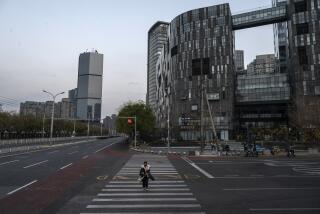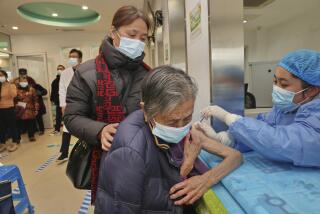Rising Medical Costs Bringing Fiscal Ruin
- Share via
SHANGHAI, China — Xing Dongliang’s mother left the kitchen for only a moment. But that was enough for the curious 2-year-old to find the scalding cooking pot and burn himself so severely he needed three months of intensive hospital care.
Paying for that treatment forced Xing’s parents and grandparents to sell their furniture and then their dirt-floored farm, including their chickens and pigs. When the bills kept coming, they borrowed heavily from relatives and neighbors.
“We lost everything we had. The hospital was like a bottomless hole,” said the boy’s grandfather, Xing Shuke.
For many of China’s hundreds of millions of farmers, injury or major illness can mean financial ruin. The near universal health care the communists introduced after seizing power in 1949 and the peasants they trained as “barefoot doctors” are now just a memory.
They’ve been replaced by increasingly expensive private clinics and hospitals, with doctors who pad meager incomes by prescribing expensive and unnecessary drugs and tests.
Most farmers bear the costs alone. By the government’s own estimate, more than 800 million people--90% of rural Chinese--have no health insurance or social safety net.
Rising medical costs have become a leading cause of poverty in the countryside. Because farmers can’t afford treatment, dangerous but curable diseases like tuberculosis and childhood parasites are rife. Childhood death rates have begun creeping up again, reversing decades of progress.
In 1998, China had 60 million people below the government’s poverty line of 25 cents a day. Nearly half of them--some 25 million people--were put there by catastrophic medical expenses, according to a U. S. study.
Malnourished farmers succumb to “a vicious cycle of illness that produces poverty, which, in turn, causes more illness,” said one of the study’s authors, Harvard University researcher Yuanli Liu.
Prohibitive medical costs have political ramifications too. The Falun Gong religious sect’s philosophies of health through meditation attracted Chinese unable to afford decent care. Alarmed by its popularity, communist leaders outlawed the multimillion-member group in 1999, labeling it a cult.
Providing farmers with modern health care was once one of the communists’ proudest achievements. Subsidized clinics staffed by peasant doctors trained to set bones and treat basic ailments helped slash infant mortality and almost double average life spans.
That system collapsed in the early 1980s as China embraced capitalist reforms, privatizing agriculture and making clinics increasingly pay for themselves.
Government-run media say the government in Beijing simply can’t afford to insure 900 million people. Rural communities have been left to find their own alternatives.
Thousands of villages and counties have experimented with insurance plans. Most have failed, however, because of corrupt or inept managers, or because the number of people enrolled was too small to form a self-sustaining insurance pool.
Beijing’s abandonment of rural areas contrasts with the billions of dollars it is promising to patch up social services in cities, where the Communist Party fears worker unrest. Yet even in cities, millions lack health insurance.
Experts say insuring the countryside will only get more expensive the longer a fix is put off.
“As the declining health of the rural population puts a greater financial burden on society, how can China develop?” said Chen Ningshan, a health policy expert in the eastern province of Shandong.
Xing Dongliang almost died after falling into the caldron of boiling water on the floor of his mother’s kitchen in May 2000. The three-month stay at a hospital near his home in Liangtang, a village in rural Henan province in central China, cost the equivalent of $9,000.
His father’s yearly cash income from farming was just $120--average in that part of Henan.
Selling the farm and other possessions, combined with the loans from family and friends, covered just half the bill.
In desperation, the boy’s 15-year-old uncle quit high school to work at a restaurant. The boy’s father was arrested in October for briefly abducting the owner of a Chinese herbal clinic, who had charged $700 for remedies that didn’t work.
The bill was finally paid by the hospital’s own staff and donors after a local newspaper ran the boy’s story, which was extreme but not uncommon. Today, the child still can’t lift his left arm above his shoulder.
“Another big health problem in our family would mean death,” his grandfather said. “No money, no life!”
More to Read
Sign up for Essential California
The most important California stories and recommendations in your inbox every morning.
You may occasionally receive promotional content from the Los Angeles Times.










